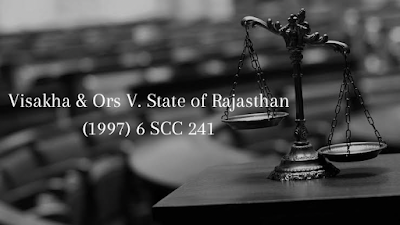Case Brief
Visakha &
Ors V. State of Rajasthan
(1997) 6 SCC 241
Naina Kapur and her organization Sakshi -Appellant
versus
The state of Rajasthan and central government -Respondent
FACTS:-
A social worker from the village of Rajasthan
named Bhanwari Devi filed the suit after she was brutally gang-raped for
forbidding a child marriage of Ramakar Gujjar's daughter. Ramakar Gujjar and
his four family members brutally raped her before her husband on 22nd September
1992. At the time of medical examination, the examinator did not mention any
report about the rape in the reports. All four accused were acquitted in the
district court with the help of a local politician. The High Court, in its judgment,
stated that "It was a case of gang rape committed out of a revengeful
situation. Several women's organizations, including Sakshi, led by Naina Kapur,
filed a Public Interest Litigation (PIL) to endorse working women's fundamental
rights under Articles 14, 19, and 21 of the Indian Constitution.
ISSUES:-
- Whether the enactment of guidelines mandatory for the repayment of sexual harassment of women at workplaces?
- Does the employer have any responsibility when sexual harassment is done to/by its employees?
JUDGEMENT:-
In consideration of the Vishakha case and Nilabati
Behera v. State of Orissa, the Court addresses two pivotal questions:
· Issue 1: Whether the enactment of guidelines mandatory for the repayment of sexual harassment of women at workplaces?
The Vishakha case highlights that fundamental
rights under Articles 14, 19(1)(g), and 21 of the Indian Constitution protect
basic entitlements, including gender equality and the prevention of sexual
harassment. The "Vishaka Guidelines" were introduced to ensure a
secure working environment, which the court sees as integral to the right to
life and a dignified existence. Employers are obligated to implement these
guidelines, making it a mandatory measure to safeguard the rights and dignity
of women in the workplace.
· Issue 2: Does the employer have any responsibility when sexual harassment is done to/by its employees?
The Indian Supreme Court introduced the
"Vishaka Guidelines" to combat workplace sexual harassment, placing
clear responsibilities on employers. These include publicly prohibiting sexual
harassment, seamlessly integrating guidelines into policies, fostering
inclusive environments, establishing efficient complaint mechanisms, and
supporting victims of third-party harassment. In essence, these guidelines
mandate employer action to prevent and address sexual harassment effectively.





.png)
.png)

![Entores Ltd V. Miles Far East Corporation [1955]](https://blogger.googleusercontent.com/img/b/R29vZ2xl/AVvXsEgCxluAqa7SACfuDCXlZR5ro5HSt6sxnhFDy7BJDuf49B4ar0dCddwjrofTjPI5qIVUV1bz-L3G-O9WznqDMpsaWXDzIrOJvw6GvwXUIUjDjDrWIMiqyW_BV4K36PDQnCGC8-VleL9Zf3Kiog6T1EpJVpuA3KmL4GCk5WnE7GGMJm5u-_eZ049yIC0iIZVB/w72-h72-p-k-no-nu/Entores%20ltd%20thumb%20nail.jpg)
.png)
.png)
.png)

.png)
0 Comments